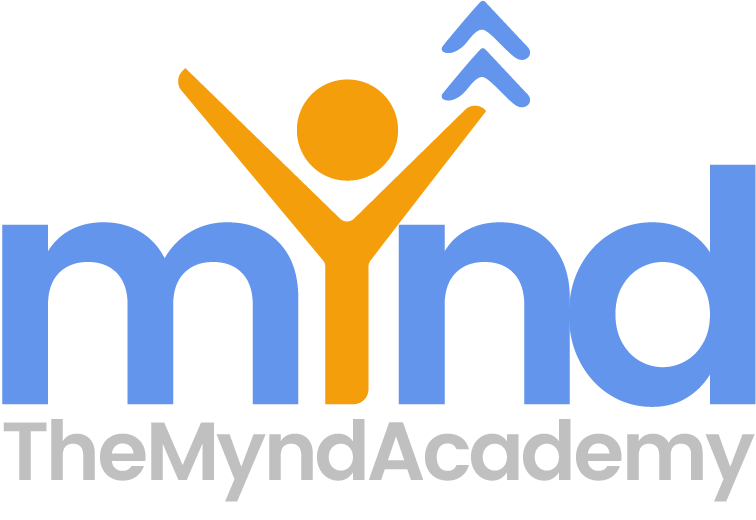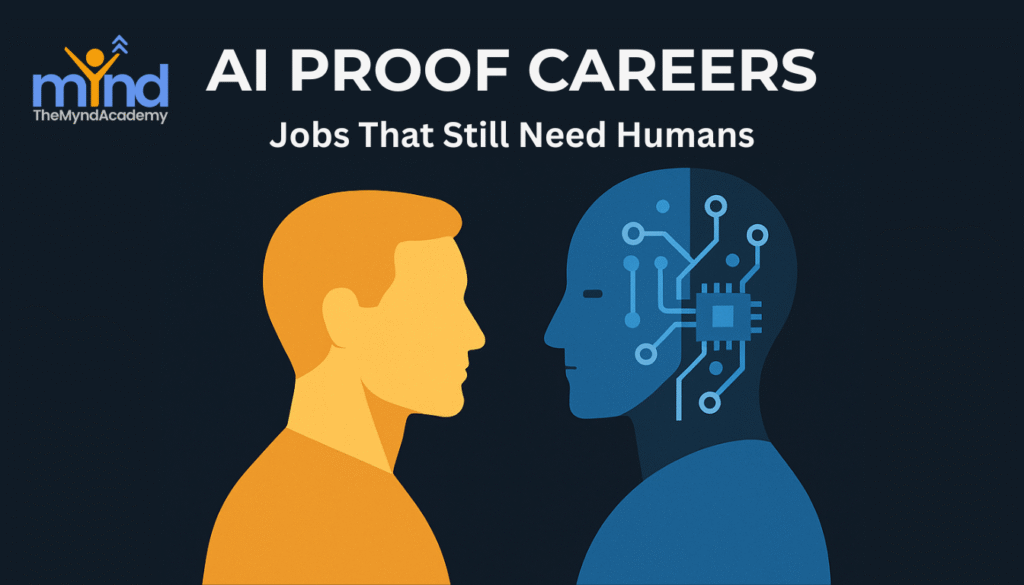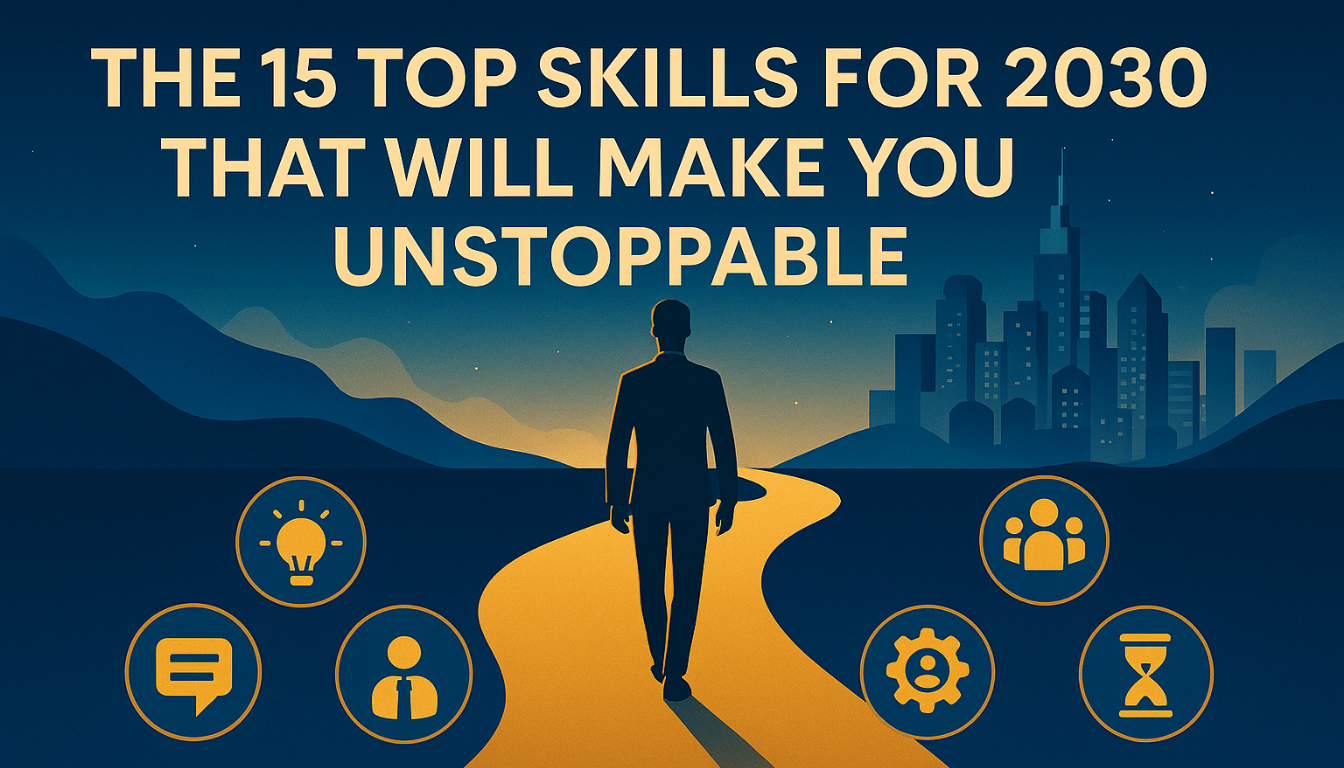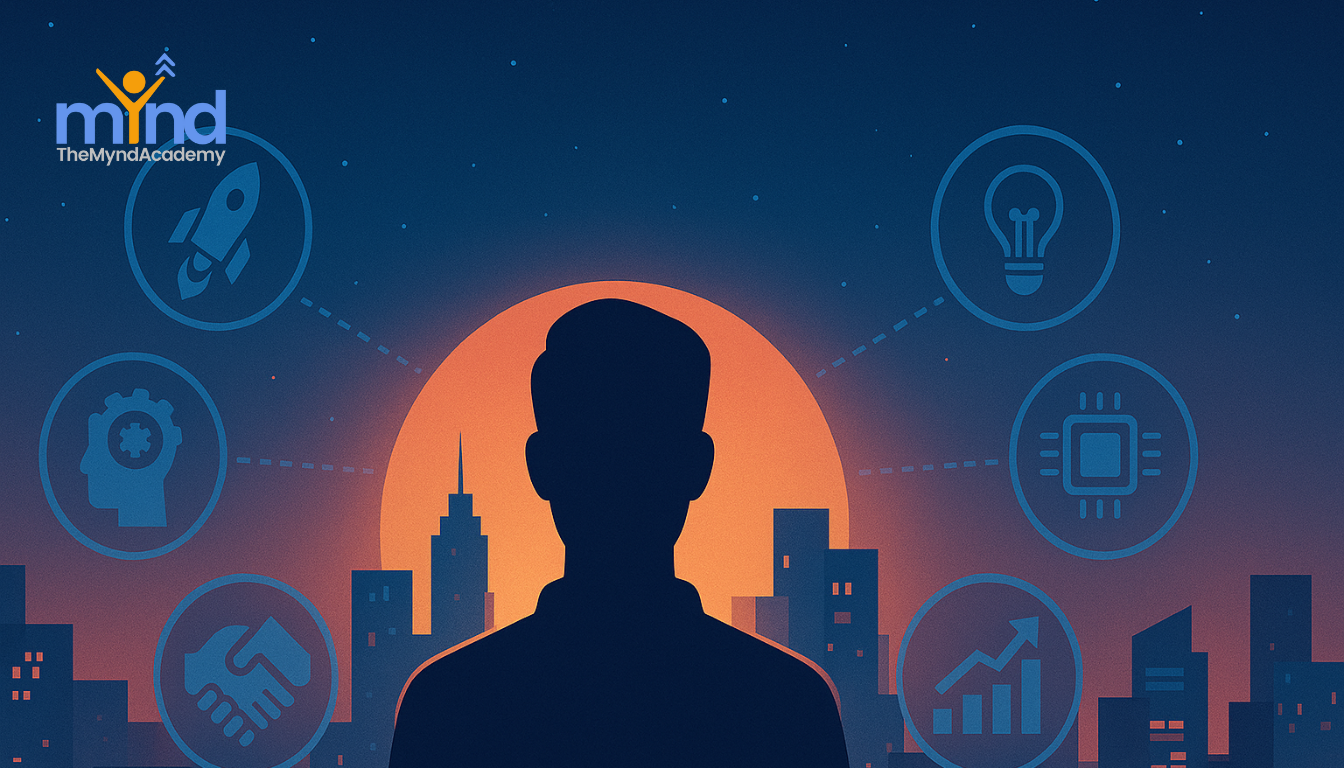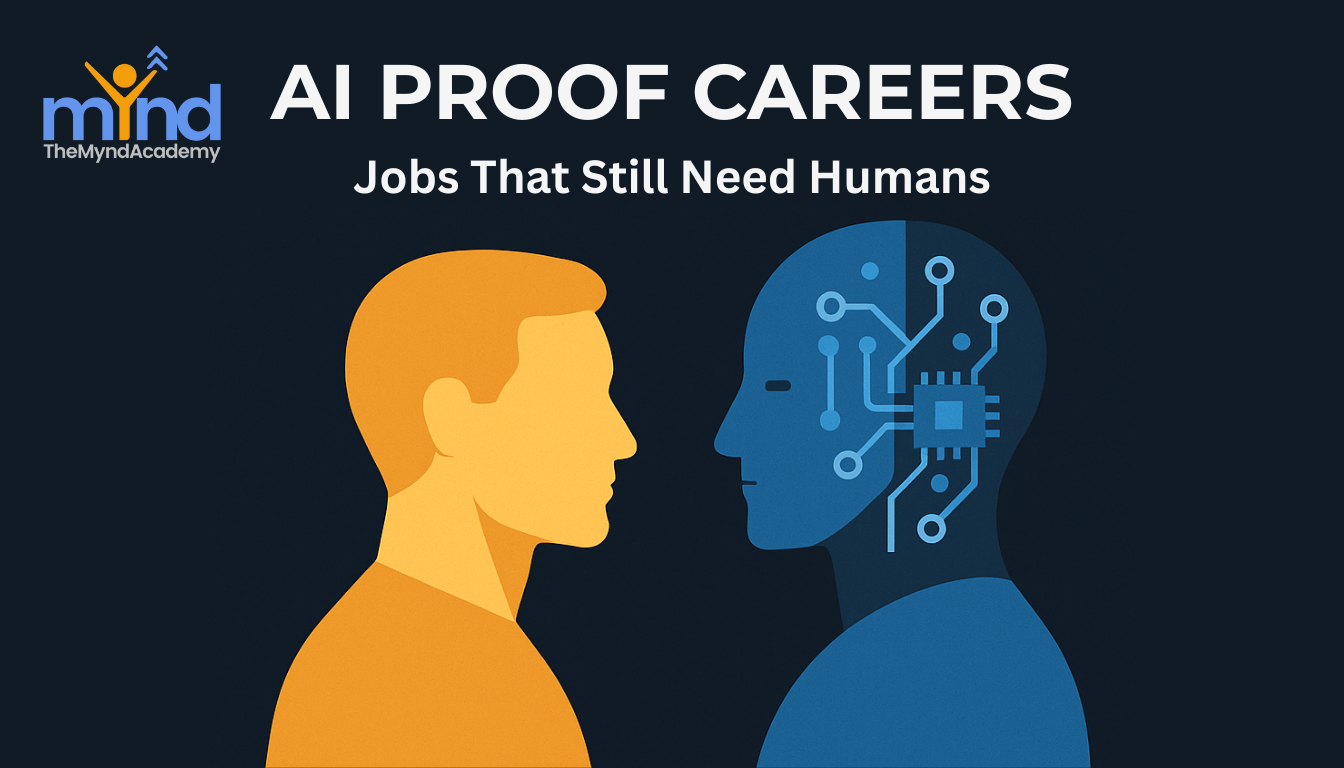AI-proof careers are becoming the smartest investment you can make in your future. Jobs that once felt secure are now on the edge of disruption. According to McKinsey, over 375 million workers worldwide may need to switch occupations by 2030 as automation reshapes industries.
Still, not every role is under threat. Some jobs rely on the kind of thinking machines can’t replicate—like emotional judgment, ethical decision-making, and creative problem-solving. These roles don’t just survive in an AI-driven world. They thrive because of the very qualities that make us human.
In this article, we’ll explore ten career paths that are built to last. You’ll learn what makes them resistant to automation, the skills that support them, and how to start preparing for a future where adaptability is your biggest asset.
In this blog, we’ll break down:
- The top 10 AI-proof careers you can pursue in 2030 and beyond,
- The essential skills these jobs require,
- And how to develop Mindset Shifts You Need to Succeed in AI-Proof Careers
Table of Contents
Why You Should Care About AI-Proof Careers
AI is deeply embedded in our everyday life; from auto-generated emails to ChatGPT to self-driving cars, artificial intelligence is quietly reshaping how we live and work. In fact, PwC estimates that AI will contribute $15.7 trillion to the global economy by 2030. However, with this transformation comes disruption.
Industries like manufacturing, retail, and even finance are automating repetitive tasks. Jobs based purely on process, calculation, or information retrieval are most at risk.
That’s why AI-proof careers matter more than ever. These careers:
- Require deep human connection and context
- Involve complex decision-making beyond data
- Are adaptive and emotionally intelligent
- Thrive on creativity, originality, and ethics
What Makes a Career AI-Proof?
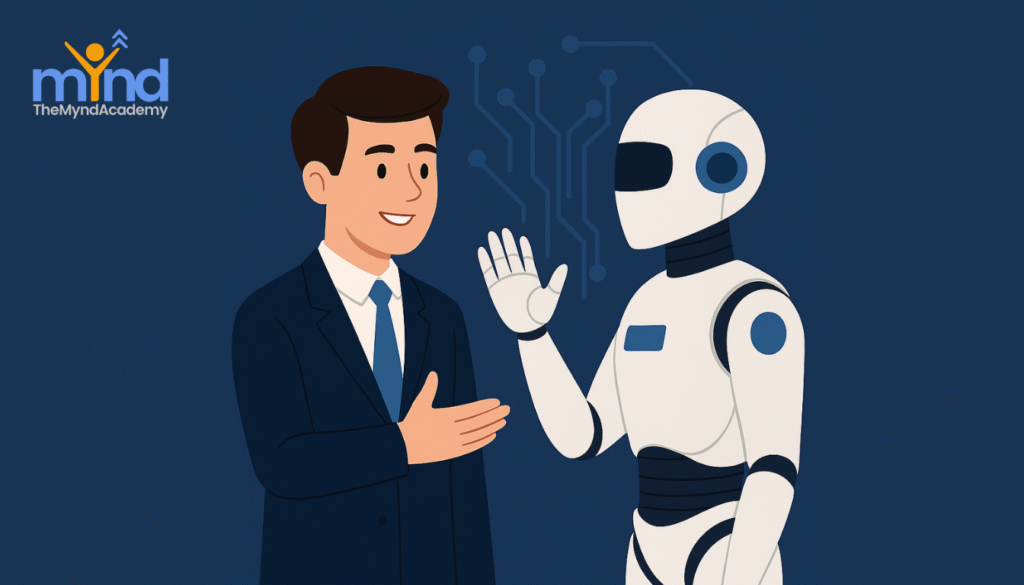
AI-proof careers are those that remain resilient amidst the rapid advancements in artificial intelligence and automation. While AI excels at processing data and performing repetitive tasks, it struggles with nuances that require human judgment, creativity, and emotional intelligence. Understanding the characteristics that make a career AI-proof is essential for professionals aiming to future-proof their livelihoods.
1. Emotional Intelligence and Human Interaction
Jobs that demand empathy, interpersonal skills, and emotional understanding are less susceptible to automation. AI lacks genuine emotional intelligence, making it challenging for machines to replicate human-centric roles effectively. Professions such as therapists, social workers, and healthcare providers rely heavily on human connection and empathy, which are difficult for AI to emulate.
2. Creative and Innovative Thinking
AI can analyze existing data to generate content, but it cannot originate truly novel ideas or concepts. Careers that involve creativity and innovation, such as artists, writers, and designers, require original thought and the ability to produce unique work. These roles depend on human imagination and the capacity to think outside the box, qualities that AI currently lacks.
3. Complex Problem-Solving and Critical Thinking
Professions that involve complex decision-making, strategic planning, and critical thinking are more resistant to automation. AI operates based on algorithms and predefined rules, limiting its ability to navigate ambiguous situations or make nuanced judgments. Roles such as management consultants, legal advisors, and strategic planners require a deep understanding of context and the ability to assess multifaceted scenarios, making them less vulnerable to AI replacement.
4. Leadership and Strategic Management
Leadership roles that involve guiding teams, making strategic decisions, and fostering organizational culture are inherently human-centric. AI lacks the capacity to inspire, motivate, and manage human dynamics effectively. Positions such as executives, managers, and team leaders require emotional intelligence, vision, and the ability to navigate complex interpersonal relationships, which are challenging for AI to replicate.
5. Adaptability and Continuous Learning
The ability to adapt to new situations, learn continuously, and embrace change is a distinctly human trait. AI systems operate within the confines of their programming and data inputs, limiting their adaptability. Careers that require ongoing learning, flexibility, and the capacity to adjust to evolving circumstances, such as educators and researchers, are more likely to remain AI-proof careers.
6: Ethical Reasoning and Moral Judgment
AI lacks a moral compass and cannot make ethical decisions without human input. Professions that involve ethical reasoning, such as ethicists, compliance officers, and legal professionals, require the ability to assess right and wrong, consider societal impacts, and make judgments based on complex moral frameworks. These roles are less likely to be automated due to the nuanced understanding they demand, making them solid examples of AI-proof careers.
7: Physical Dexterity and Manual Skills
Jobs that require fine motor skills, physical dexterity, and hands-on tasks are challenging for AI and robotics to replicate. Professions such as electricians, plumbers, and carpenters involve intricate manual work and problem-solving in dynamic environments, making them less susceptible to automation and strong contenders among AI-proof careers.
Cultural Sensitivity and Contextual Understanding
AI systems often struggle with understanding cultural nuances and context-specific information. Careers that require cultural sensitivity, such as diplomats, anthropologists, and international business professionals, depend on the ability to interpret and navigate complex social and cultural landscapes, which are difficult for AI to manage effectively. These are among the more globally relevant AI-proof careers.
Top 10 AI-Proof Careers in 2030 and Beyond
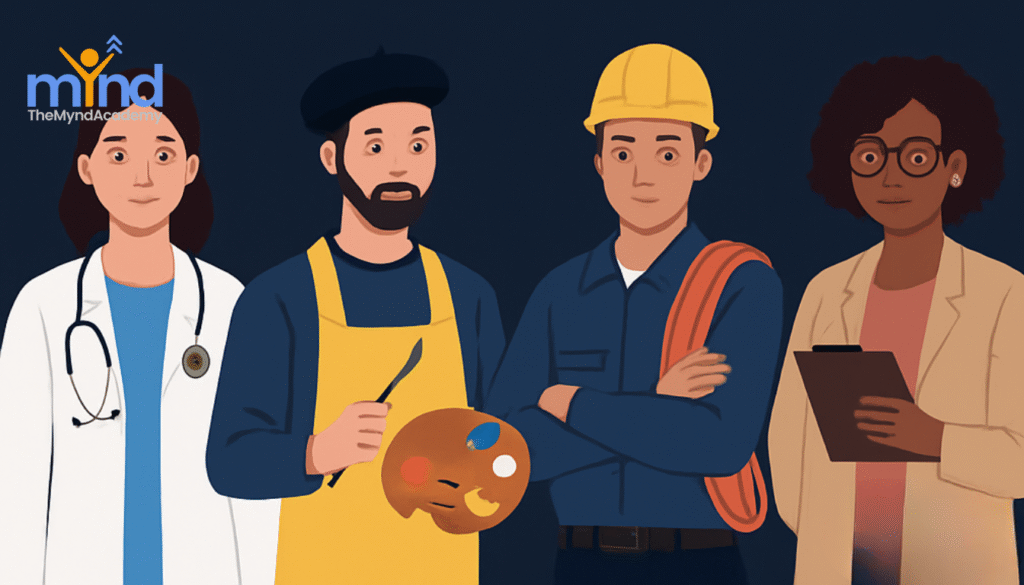
Let’s look at the top AI-Proof careers and skills that are will guarantee yous success in the upcoming years of complete automation. Each of these roles taps into the human strengths that machines still can’t touch: empathy, complex thinking, moral judgment, and original creativity.
1. Healthcare Professionals
Among the most future-secure roles are those in healthcare. From nurse practitioners and physician assistants to physical therapists and mental health clinicians, these jobs require a combination of emotional intelligence, technical skills, and real-time decision-making. The U.S. Bureau of Labor Statistics projects a 45% growth rate for nurse practitioners by 2032—making it one of the fastest-growing professions. Unlike AI, which can assist with diagnostics but lacks bedside manner, humans can assess tone, pain, fear, and context in a patient’s condition. These are the very reasons healthcare stands out as one of the most essential AI-proof careers today—and will only become more vital in an aging global population.
2. Creative Professionals
Writers, designers, filmmakers, illustrators, and other creatives bring more to the table than aesthetic flair. They create culture, meaning, and connection. While AI tools can mimic styles or generate content quickly, they lack emotional depth, intention, and originality. Great creative work isn’t just about output, it’s a combination of resonance, reflectivity, and introspection. As the world becomes more digitized, the need for distinctive human voices will only grow. That’s why creative roles are foundational to the future. For those with unique vision and storytelling skills, creative fields offer some of the most dynamic AI-proof careers available.
3. Skilled Trades
Automation may be accelerating, but it still has physical limits. Jobs like electricians, plumbers, HVAC technicians, and carpenters involve unpredictable environments, fine motor skills, and creative problem-solving that AI and robots struggle to replicate. These trades require on-the-ground thinking and real-time adjustments, and no algorithm can rewire a live circuit during a home renovation. Despite their low visibility in tech conversations, skilled trades are quietly among the most secure AI-proof careers of the next decade. As infrastructure ages and housing demands increase globally, these professionals will be more in demand than ever.
4. Educators and Trainers
Teaching is not just about delivering content. It’s about identifying learning gaps, adapting methods, mentoring individuals, and fostering curiosity. While AI can support classroom management and automate grading, it cannot replace the motivational and adaptive qualities of an effective educator. The ability to understand different personalities, tailor approaches, and build world confidence is central to human teaching. Educators, especially those who also embrace digital tools are in one of the most valuable AI-proof careers shaping the next generation of learners.
5. Mental Health Professionals
The digital era has made life easy in alot of ways, but at the same time, it has increased stress and cognitive load in numerous ways; in an age of digital overwhelm and emotional burnout, therapists, counselors, and psychologists play an increasingly important role. Mental health work requires deep listening, emotional validation, trust-building, and an understanding of complex life stories. AI may offer chatbots or symptom checkers, but it can’t hold space for someone’s trauma, grief, or recovery. Mental health isn’t about efficiency; it’s about healing. This makes the profession one of the clearest examples of AI-proof careers rooted in empathy and human depth.
6. Human Resources Specialists
Managing people is more than processing payroll or scheduling interviews. It’s about resolving conflict, creating inclusive cultures, mentoring talent, and aligning human goals with organizational vision. HR professionals must make value-driven decisions in ethically sensitive situations. AI can help with applicant screening or performance tracking, but it can’t navigate the emotional complexity of team dynamics or workplace relationships. That’s why HR remains one of the most impactful AI-proof careers inside modern organizations, especially as workforces become more diverse and hybrid.
7. Legal Professionals
The law is filled with nuance, precedent, and human consequences. While AI tools can scan contracts or organize case data, lawyers, legal analysts, and judges must interpret the law in emotionally and ethically complex situations. They deal with context, not just code. Legal professionals often make judgment calls that balance logic, compassion, and morality—areas where AI fails. With laws evolving alongside new technologies, the legal field is undergoing transformation, but not replacement. This makes it one of the most intellectually rigorous and enduring AI-proof careers.
8. Social Workers
Social work often means showing up where systems fail—helping people navigate trauma, poverty, addiction, or abuse. These professionals need cultural sensitivity, emotional strength, and on-the-ground adaptability. Their work isn’t scripted, and outcomes aren’t always clean. AI can’t intervene in a domestic violence case or offer meaningful support to a grieving parent. Social workers operate where empathy and moral reasoning matter most. For those seeking high-impact, people-centered paths, social work stands strong among AI-proof careers that make a real difference.
9. Entrepreneurs
Starting a business requires vision, risk-taking, and relentless adaptability. No algorithm can predict a founder’s instincts or replicate their personal grit. Entrepreneurs innovate where no roadmap exists. They respond to customer needs, spot gaps in the market, and build solutions from the ground up. While AI may assist with operations or market research, the ability to think disruptively and move decisively belongs to humans. For those willing to learn fast and pivot smart, entrepreneurship is one of the boldest and most rewarding AI-proof careers in the future economy.
10. Research Scientists
Research is about asking questions that haven’t been answered yet. Whether in climate science, neuroscience, or clean energy, researchers must design experiments, question assumptions, and navigate unknowns. AI can crunch numbers and model possibilities, but it can’t generate hypotheses, assess broader impacts, or recognize when data doesn’t align with theory. Scientific discovery thrives on human curiosity and disciplined skepticism. That’s why research science holds a central spot on the list of AI-proof careers, especially in a world facing complex global challenges.
Emerging AI-Proof Careers You Might Not Have Considered
While roles like healthcare professionals and educators are commonly cited as AI-resistant, several other careers are gaining prominence:
- AI Ethics Officers: With the rise of AI, there’s a growing need for professionals who can navigate ethical dilemmas, ensuring AI systems are fair and unbiased.
- Human-AI Interaction Designers: As AI becomes more integrated into daily life, designing intuitive interfaces for human-AI interaction is crucial.
- Sustainability Consultants: Addressing climate change requires human judgment and ethical considerations, areas where AI falls short.
The Essential Skills You Need for AI-Proof Careers
To thrive in the evolving job market, it’s crucial to develop a blend of soft and hard skills that are less susceptible to automation. These AI-proof careers demand abilities that machines can’t easily replicate.
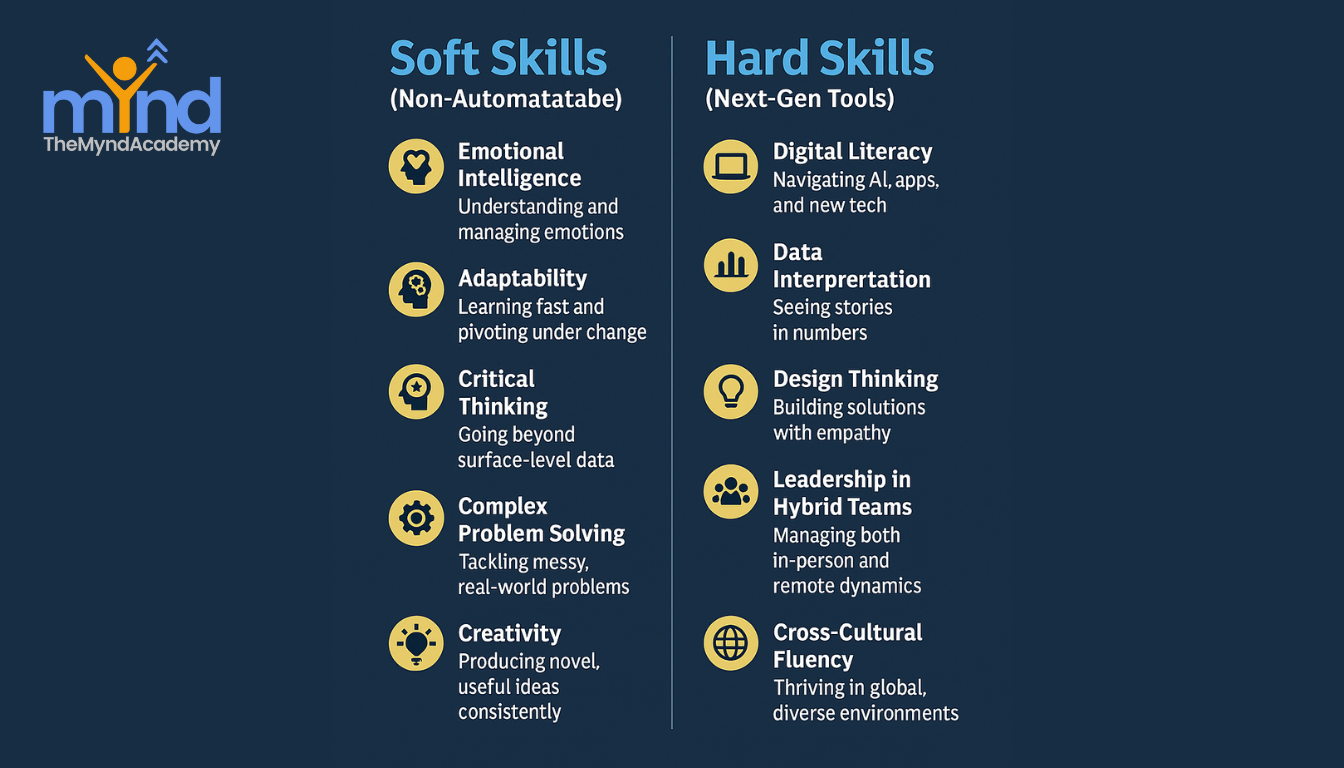
Soft Skills (Non-Automatable)
Emotional Intelligence
Understanding and managing emotions in oneself and others is vital. In AI-proof careers, this skill enables professionals to navigate complex interpersonal dynamics, fostering collaboration and empathy that machines lack.
Adaptability
The capacity to learn quickly and pivot in response to change is essential. As industries evolve, AI-proof careers require individuals who can adjust strategies and embrace new challenges with resilience.
Critical Thinking
Analyzing information beyond surface-level data allows for informed decision-making. In AI-proof careers, critical thinking helps professionals assess situations, identify problems, and develop effective solutions.
Complex Problem Solving
Tackling intricate, real-world issues necessitates a deep understanding of various factors. AI-proof careers benefit from individuals who can dissect problems and devise innovative approaches to address them.
Creativity
Generating novel and useful ideas consistently is a human-centric skill. In AI-proof careers, creativity drives innovation, enabling professionals to develop unique solutions and adapt to changing environments.
Hard Skills (Next-Gen Tools)
Digital Literacy
Navigating AI, applications, and emerging technologies with ease is fundamental. AI-proof careers require proficiency in digital tools to enhance productivity and stay competitive in a tech-driven landscape.
Data Interpretation
The ability to extract meaningful insights from data is crucial. In AI-proof careers, interpreting data informs strategic decisions and identifies opportunities for growth and improvement.
Design Thinking
Building solutions with empathy involves understanding user needs and creating human-centered designs. AI-proof careers leverage design thinking to innovate and solve problems effectively.
Leadership in Hybrid Teams
Managing both in-person and remote dynamics requires strong communication and coordination skills. AI-proof careers benefit from leaders who can foster collaboration and maintain team cohesion across diverse settings.
Cross-Cultural Fluency
Thriving in global, diverse environments necessitates cultural awareness and adaptability. AI-proof careers demand professionals who can navigate and respect different cultural contexts, enhancing collaboration and inclusivity.
The Importance of AI Fluency in AI-Proof Careers
Understanding AI’s capabilities and limitations is essential. Professionals should aim to:
- Develop AI Literacy: Grasp how AI tools function to leverage them effectively.
- Engage in Prompt Engineering: Crafting effective prompts can enhance AI tool outputs, a skill increasingly in demand.
- Stay Updated: Regularly update knowledge on AI advancements to remain relevant.
Mindset Shifts You Need to Succeed in AI-Proof Careers
1: Embrace Lifelong Learning
As industries evolve, professionals must continually update their skills to remain relevant. Engaging in ongoing education, whether through formal courses or self-directed study, ensures that individuals can adapt to new technologies and methodologies, maintaining their competitiveness in the job market.
2: Set 6-Month Learning Cycles
Implementing structured learning intervals, such as 6-month cycles, can significantly enhance skill development in AI-proof careers. This approach allows professionals to set clear, achievable goals, monitor progress, and adjust learning strategies as needed. Regularly updating one’s skill set in this manner ensures alignment with industry advancements and technological innovations.
3: Build a Feedback-Rich Environment
Creating an environment where feedback is actively sought and constructively provided is vital for growth in AI-proof careers. Feedback mechanisms facilitate continuous improvement, helping individuals identify areas for development and refine their skills accordingly. Such environments encourage open communication and foster a culture of learning and adaptability.
4: Practice Intentional Upskilling
Professionals should identify emerging trends and technologies within their field and proactively acquire the necessary competencies. This intentional approach to upskilling ensures that individuals remain at the forefront of their industry, capable of addressing complex challenges and leveraging new opportunities.
5: Avoid Burnout: Focus on Purpose, Not Just Productivity
Sustaining a fulfilling career in AI-proof professions requires more than just productivity; it requires you to have a clear sense of purpose. Aligning one’s work with personal values and long-term goals can enhance motivation and job satisfaction. By focusing on meaningful contributions rather than solely on output, professionals can maintain their well-being and continue to grow in their roles.
FAQ – AI-Proof Careers and Future-Ready Skills
Q1: What jobs will disappear due to AI?
Repetitive, rules-based jobs like data entry, telemarketing, and some aspects of accounting and legal processing are most at risk.
Q2: How do I know if my job is AI-proof?
Ask: Does this job rely heavily on human judgment, creativity, or emotional connection? If yes—it’s more likely to be safe.
Q3: Can AI-proof careers still evolve with tech?
Absolutely. The goal isn’t to resist tech—but to partner with it. AI-proof careers evolve with changing needs.
Q4: What’s the best age to start reskilling?
Now. Whether you’re 18 or 48, the best time to learn future-ready skills is always the present.
Q5: How do I develop a future-ready mindset?
Stay curious, learn in cycles, seek feedback, and link growth to purpose. Mindset is your ultimate long-term asset.
Embracing Human-AI Collaboration

Rather than viewing AI as a threat, professionals should see it as a collaborator:
- Augment Decision-Making: Use AI for data analysis, but rely on human judgment for final decisions.
- Enhance Productivity: Automate routine tasks with AI, freeing time for creative and strategic work.
- Continuous Learning: Engage in lifelong learning to adapt to AI advancements.
The Future Belongs to the Human Advantage
The rise of AI doesn’t mean the fall of humanity. It means a shift that rewards people who can do what machines can’t. It’s not about being anti-AI. It’s about being more human in a world of machines.
At The MYND Academy, we believe that success isn’t random. It’s built—one thought, one habit, one skill at a time. If you want to master the mindset and the skills that will carry you confidently into 2030 and beyond, the time to start is now.
Need Guidance?
Download our FREE “Top Skills 2030 Toolkit” and start mastering the skills that matter most in an AI-driven world.
